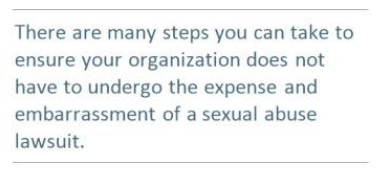 Nonprofits, faith-based organizations and other similar groups are at risk for false allegations of sexual assault due to the recent spotlight on the issue and the unique characteristics of these organizations, namely the frequent, unsupervised interaction between children and a trusted adult. Whether legitimate or phony, sexual-abuse allegations involving a minor can have catastrophic consequences for your group or organization.
Nonprofits, faith-based organizations and other similar groups are at risk for false allegations of sexual assault due to the recent spotlight on the issue and the unique characteristics of these organizations, namely the frequent, unsupervised interaction between children and a trusted adult. Whether legitimate or phony, sexual-abuse allegations involving a minor can have catastrophic consequences for your group or organization.
You can take several steps to ensure your organization does not have to undergo expensive and embarrassing lawsuits, including careful screening of all staff; strictly enforced supervision guidelines; sufficient education and training; and a specific plan of action to follow when someone suspects or reports inappropriate behavior.
Carefully Screen Potential Staff
One of the most important things your organization can do to reduce the risk of a sexual misconduct or harassment allegation is to take on staff and volunteers carefully. Require that all staff, whether paid or volunteer and regardless of their job description, consent in writing to a federal criminal background check. If you sponsor or organize overnight trips, those volunteers should also be required to consent to a federal background check. You should also search for all potential employees and volunteers in the National Sex Offenders Public Registry to check for any type of sex offender record.
In addition to conducting an official background check and examining the National Sex Offenders Public Registry, you should require all applicants—whether paid or volunteer—to provide a list of non-family references, complete with contact information. For those assuming leadership positions, ask to contact their previous employer. However, it is not enough to simply ask for this information—with every applicant, you should follow through and contact the references. Ask specific questions about the applicant’s reputation and character to evaluate whether he or she will present a risk to your organization.
Depending on the size of your organization, many people may look at one application, and the review process could go through several hands. To make the process easier and more effective, require documentation for all background and reference checks conducted. Likewise, if any applicant is allowed to skip the background or reference check process, require that a waiver be signed by the person who made the decision to exempt the applicant.

Establish Supervision Guidelines
It is important to set guidelines for staff and volunteer conduct for two reasons. First, it protects minors from ill-intentioned adults and makes the environment safer. Also, it protects employees and volunteers from potentially false allegations.
The most serious risks come when an adult has unsupervised contact with a minor, so these situations should be avoided whenever possible. Some suggestions for supervision guidelines include having two adults in the room with children, requiring two or more children to be present with one adult and having a supervisor or other staff member randomly check in on situations when an adult is with minors. For religious organizations, consider implementing a policy that volunteers must be members of the community for at least eight months before being allowed to supervise children or youth alone.
If your organization conducts overnight trips, the risks and potential liability increase exponentially. Be sure to provide an adequate ratio of adult volunteers to participants for security purposes, and never allow male and female participants to sleep in the same area. Sleeping areas should also have supervision guidelines, such as the two-adult and the two-child rules previously mentioned.
Provide Staff Education and Training
An important step that some organizations overlook is providing adequate education and training to allow employees and volunteers to understand the risk of sexual misconduct allegations. If you educate employees and volunteers, they are more likely to work with you to help reduce the liabilities and risks associated with dealing with youth and children.
Take the time upon hiring to educate staff on the policies and procedures of . Be sure to emphasize that sexual misconduct training is not accusatory; rather, it is for their protection. Also, it is a good idea to re-train all staff annually as a reminder about the seriousness of the risk.
Take Allegations Seriously
Many organizations get into trouble not because they failed to conduct the necessary background and reference checks, but because when there was evidence of accusations or problems, they did not react quickly and appropriately.
In training sessions, stress that all staff—including volunteers—is required to report suspicions or evidence of abuse to senior staff members. Senior staff should forward these reports immediately to the proper law enforcement officials.
To avoid further risk, take immediate action. Remove the employee or volunteer allegedly responsible from duty and do not allow him or her to supervise or come in contact with minors until the investigation is complete. This may be a difficult step, especially if it causes hardship or if there is widespread belief the staff member is innocent, but it is crucial in preventing expensive lawsuits claiming negligence.
Documentation is the key to reduced risk in allegation-response situations. Keep detailed written records of the allegations and of any interviews with the victims or the alleged abusers. Re-visit your records and make sure they reflect the adequate background checks and reference checks you conducted to further document your efforts to prevent abuse situations.
The bottom line is your organization should work to avoid all circumstances that could lead to accusations of sexual misconduct or abuse, whether those claims are legitimate or false. You have the duty to protect your staff, volunteers and children from the risks of harassment and harassment accusations. The nature of your organization makes this significantly more difficult, but with proper guidance and careful planning, you can mitigate risks and liabilities.
ChurchInsure is a division of Anchor Insurance Agencies specializing in the unique insurance and risk management needs of religious institutions. Visit our website to learn how we can serve you at anchor-insurance.com/churchinsure.
© Zywave, Inc. All rights reserved.


